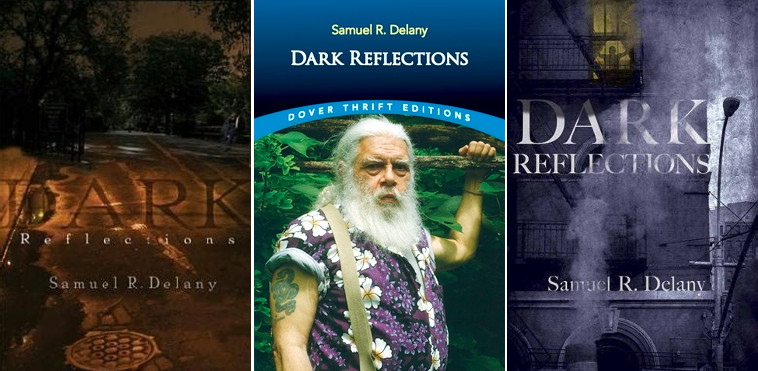Roads not travelled
Samuel R. Delany's Dark Reflections: A marriage of SF and the mundane

Three covers from Samuel R. Delany's novel Dark Reflections.
With thousands of books published in the English language every year, to name any particular book or particular writer as "the best" of any particular category is to be either simply foolish or foolishly hubristic.
But still ... Samuel R. Delany is still the best writer working in the English language today. His recent novel, Dark Reflections, is a quiet, almost elegiac proof, not only of Delany's mastery of his craft but, perhaps more interestingly, that while you might take the science fiction out of the story, you can't take the science fiction out of the writer — at least, not this writer. And further, that "science fiction" may be less a matter of technology and time-lines than it is one of attitude and tone.
Dark Reflections is unquestionably a "literary" novel and yet, in its uncompromising story of one man's (unique — and yet, somehow universal) life, it nevertheless feels like science fiction in that it offers the reader the chance to explore the aline — that is, to get to know another being. If not "the universe in a grain of a sand", then the universe in the life of a man.
Delany first came to my attention by happenstance. I was 13 or so years old and his mammoth novel Dhalgren called itself to my attention from among the generic science fiction littering the small section at a Sudbury department store.
That novel, a dense and difficult 800+ page opus with no easily-discernible plot, no space-ships or aliens, but lots of dialogue, lots of sex, and some violence, was a revelation to me, and no matter that even now, 30 years later, it is still a novel I don't pretend to "get".
Dhalgren can be read as the culmination — or even, as a "coming-out" — of Delany's use of science fiction's tropes to explore what it is to be an alien among one's own kind, of the strangeness that forever lies at the heart of the everyday.
Both black and gay, in retrospect Delany's early novels show a growing willingness (or perhaps, a commercial ability) to deal overtly with those things SF gave him the room to play with in code. With Dhalgren, Delany was finally able to explore sex in (almost?) all its polymorphous varieties, along with the ways in which various types of social structure encourage or inhibit its actualization as either acceptable or unacceptable (or both) behaviour.
Which is not to say that sex and sexuality form the entirety of Delany's interests. Far from it. Even his frankly pornographic The Mad Man is as much "about" literature and alienation as it is about sex or sexuality — though I suspect Delany himself would argue that all four are but arbitrary points marked along the bell curve of the human experience. In the universe according to Delany, we are all aliens, to some extent, to one another; at the same time, we do not lack for bridges, for communication. If we can't be one another, we can most certainly talk to each other.
But I digress.
Dark Reflections reads in some ways like an especially perceptive and sympathetic biography, in others like an autobiography written by a man who can reveal himself only by what he alludes to, by those things he knows happened but which he can not directly say. A man who, looking back upon his life, sees almost nothing but doors not passed through.
I suspect it is in many ways an autobiography of Delany himself — as seen through the proverbial glass, darkly; of a Delany that might have been, had he been blessed (or burdened) with a little less courage and a few, slightly different, earlier life-experiences.
Dark Reflections is the story of Arnold Hawley, a moderately successful poet (one of his books enjoyed multiple-printings and sold as many copies as a successful Canadian novel), African-American (or Black, or black, or negro, depending on the style at the time of his life) and gay (or queer or a fag, depending on ...), like Delany himself.
Written in three parts, each of which could almost stand alone as a novella, the novel opens as Hawley closes in on his twilight years.
In 1987's rainy October, when squirrels stopped, stared, then sprinted along the bench-backs away from the kids with the earrings, combat boots, and dog collars, who for more than fifteen years had been hanging out in Tompkins Square Park, Arnold's sixth books [sic?*] of poems, Beleaguered Fields, won the Alfred Proctor Prize — an award given once every three years that concerned a small circle of New York poets and men and women of letters.
Hawley lives in a small, rent-controlled walk-up apartment in New York's Lower East Side. He has a teaching job at a small university and lives in the sort of genteel poverty one might expect of a serious (but never seen on Oprah) poet.
The novel's first section, "The Prize", covers the long 20 years of Hawley's life following his poet's high-point, and moving, very slowly, with almost no dialogue, towards the "loss" of a second prize he had no chance to win.
The second, "Vashti In the Dark", pulls the reader back into the early 1970s. The Stonewall riots are a thing of the past, "black power" is in its heyday, and Arnold Hawley is still (was still?) a poet too frightened to actually take part in all that was going on around him.
Hawley, unable or unwilling (just where is the difference between the two?) watches the semi-public sex life of the (still semi-closeted) world of gay New York from a park bench in Tomkins Square. A bench facing the entrance to the men's door of the park's public bathrooms. (Almost) unconsciously paying heed to those men coming and going (for sex) through its intimidating door.
One day he meets, via the hazards of chance, a young woman, Judy (of several last names), who quickly but believably — give what the reader already knows of Hawley's latter years — pushes him into a brutally short and tragic marriage.
Though we never learn much about Judy beyond a truly horrific childhood, Delany's sparse character-sketches are more than enough to make her seem to be a fully-realized human being; like the friend-of-a-friend whom we've met a few times, we don't know Judy but we believe in her.
The final section of Dark Reflections, "The Book of Pictures", is the shortest and chronologically the earliest.
Arnold Hawley is in his early 20s, recently moved to New York after having spent most of his life under the care of his spinster aunt, Bea —
Here I have to stop and digress. Though Bea was a spinster and (presumably) a virgin, to describe her simply as a "spinster", while true, is about as accurate as it would be to describe John Lennon as having been a house-husband, or Delany himself as a Professor of English and Creative Writing.
Whether writing space opera, pornography or literary fiction, Delany is a serious writer; he seldom if ever asks his readers to accept stereotype as character —
In truth, Bea is a remarkable woman. — intellectually curious, proud, progressive and very consciously battling against the brutal racism of 20th century America. She is also a serious Roman Catholic, who (Arnold never doubts) would simply be incapable of accepting the fact of his homosexuality. (As a reader, I wondered if Arnold was right in that analysis; as indeed, I wonder if Delany thought Arnold's belief was accurate.)
In either case, though Arnold at length comes to accept that he is gay, he does (almost) nothing about it. His few, early pushes against the multiple doors of his orphan's insecurity, his poet's introversion and his personal cowardice lead to road after road not taken.
Dark Reflections is a quiet tragedy. Arnold was a moderately successful poet; he dared enough to eschew the most common road in favour of a writer's life. But the most important emotional relationship of his life was the bond he shared with his surrogate mother/father, the formidable Aunt Bea. Whether her fault, his fault — or whether placing blame is irrelevant — Delany's portrait quite properly leaves "the answer" to the reader's own imagination.
As with any of Delany's novels (at least since since 1966's Babel-17), Dark Reflections defies genre conventions even as it follows many of them. Without a raygun, space-ship or time machine in sight, Dark Reflections nevertheless feels like the very best science fiction (or "literature"), because it invites the reader to experience a world beyond his or her own.

Add new comment